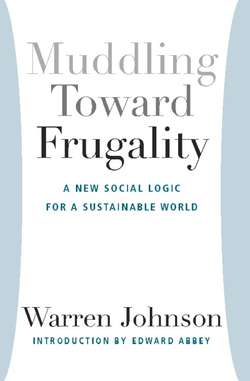Читать книгу Muddling Toward Frugality - Warren Johnson - Страница 8
На сайте Литреса книга снята с продажи.
ОглавлениеCHAPTER I
Neither Utopia Nor Oblivion
A growing element of fear haunts our thinking about the future of industrial society. With the emergence of chronic unemployment, rising prices, and unresolved social problems, some key factors affecting the basic conditions of our lives seem to be slipping beyond our control. The old utopian visions no longer move us, and new ones seem powerless before the momentum of modern industrial society. For the most part, we simply cling to the present rather than face the fearful prospect of deterioration and collapse.
This apprehensiveness is unfortunate since the future is not likely to be anywhere near as bleak as we tend to picture it; collapse is no more likely than utopia. These extremes are both contrary to human behavior. The same will-to-survive that works to prevent collapse and oblivion also works to thwart the utopian designs of a philosopher king. Life at all levels is a hurlyburly affair of getting on as well as possible in the circumstances living things find themselves in. Between the two extremes of utopia and oblivion is the whole of life. It is a wide area with many paths leading to different places. In today’s world, some of these paths have the appearance of traditional cultures, while others are new. But all reflect the need to be frugal in the use of land and resources.
The origins of the word frugality in Latin are frugalior, meaning useful or worthy, and frux, meaning fruitful or productive. These meanings give the word a nice feeling, but unfortunately, the word has changed over the years, and has come to mean thriftiness, the abstention from luxury and lavishness. In this book, the word will be used in its original meaning—to suggest economic conditions in which society is obliged by the force of circumstances to make full and “fruitful” use of all its resources.
We are already being forced slowly and against our will to husband resources. Scarcity is the mechanism that is inexorably diverting industrial society from the path of sustained growth that has characterized the modern era. This scarcity will be reflected primarily in higher prices, and it will increasingly interfere with what we presently see as the orderly process of things. Our economy, our institutions, and our social values will all become less useful and will gradually be replaced by new ways that reflect the need to husband resources. Human skills and muscles will begin to replace fossil fuels. Small scale, labor-intensive production will be increasingly competitive with the large, centralized, manufacturing operations that evolved under conditions of cheap energy and transportation.
People will slowly redistribute themselves to be able to utilize available land and resources more easily, and to avoid increasingly expensive transportation. As mobility is reduced, the traditional basis for responsibility to one’s community and environment will be reestablished; people will have to live with the consequences of their actions rather than escape the effects by moving away. As communities become more necessary, the values that support them will strengthen, filling the void left by our growing disillusionment with modern values and the large-scale industrial economy. The timeless virtues of loyalty, cooperation, and selflessness—all thinly observed now—will once again be functional, as will the simple pleasures of family and friends, the knowledge of a trade, and the comforts of a well-known environment.
The future will perhaps be less spectacular than the optimists and the technologists may like to see it. They might speak of the loss of will to challenge obstacles, challenges our forebears would have relished, and they might lament the loss of the robust Renaissance spirit that was the mark of modern man and took Western civilization so far. But they might also forget that Machiavelli was as much a Renaissance figure as was da Vinci. By the same token, the future will be less dark and foreboding, less strange and alien than the pessimists see it. The fear of modern society collapsing from its own weight and rigidity will be reduced as the future evolves away from its present dependence on machines and toward a way of life that is down-to-earth and familiar; a life based on simplicity and the frugal use of resources. How good a life it will be depends largely on the quality of our adaptation to the barriers ahead of us.
